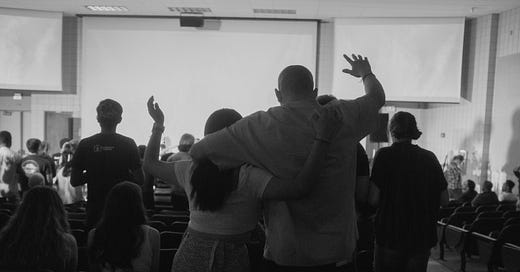Dear Gen-Z Christian (Content Creator) And Any Christian For That Matter
Beware the eisegesis trap
It’s been quite astonishing and amazing to see so many brothers and sisters of all ages throw their [phone] camera in front of their face, hit record, and talk about the Scriptures, about Jesus, and following Him in a chaotic and broken world.
But there was a pattern I began to see - one that I was concerned about a few years ago - particularly regarding Gen-Z and their discipleship to Jesus.
Disclaimer: I think this discipleship problem ultimately boils down to a lack of baton passing from Millennials and Gen-xers, so I can’t entirely blame Gen-Z for what I’m about to write.
Eisegesis. Eisegesis. Eisegesis.
It’s a tale as old as time with “modern” people reading ancient texts.
But quickly, definitions are in order.
Eisegesis - reading one’s own ideas into the text (Scripture).
Exegesis - discovering the intended meaning of the text by the original author.
In a world where Gen-Z is plagued by anxiety, depression, grief, sights and sounds the young mind was never meant to experience, and a digital screen in front of them over a long period of time, it is no wonder eisegesis is commonplace among them.
But what’s the link between the chronic pains of Gen-Z and eisegesis?
A working theory: when one is in a constant state of pain, trauma, or just plain high alert of the next blow to come, we all seek some sort of salve and balm to ease the pain.
Enter the Bible.
The temptation to read one’s life circumstances into an ancient text in order to find meaning behind any and all suffering can be potent.
I know because I’ve been there before.
And it doesn’t surprise me to see this in the current generation of younger people.
The danger of eisegesis at the end of the day lies in a multitude of spaces, but two come to mind for Gen-Z:
We make ourselves the hero of the Bible (Jesus is).
Coming from the generation labeled as the “selfie-generation”, Gen-Z aka the “me-generation”, I understand not being the hero of the story to be a salty reality. But trust me when I say, you don’t want to be the hero of your own story because we’ll ultimately lose. When we can submit to the already reality that Jesus is the hero of the cosmological story of good and bad, holy and evil, the world makes a lot more sense.
The authority of the Scriptures is removed because it is no longer cohesive, coherent, and congruent once we inject our own narrative into history.
The moment the authority of the Scriptures is compromised, the Christian worldview and the Way of Jesus begins to crumble because Jesus (and His words) become another good teaching. Nothing more, nothing less. When we inject our own story into the wider narrative of Scripture, we place ourselves in a space we never really occupied. Rather, inject the Biblical narrative into your own story and see places of joy become wells of joy, suffering still remains hard but clarity is accessible, and life becomes more full.
Instead of eisegesis, my hope is that we can see more resources on social media from Christian content creators, Bible teachers and scholars, and your everyday Christian to teach the beauty of textual exposition, proper hermeneutical methods and exegesis, and how those methods can point us to the Living Hope found within the Scriptures.
—
If you made it this far and would like to read on what exegesis and hermeneutics looks like, let me know in the comments or DM me on social media!





SO GOOD. Grateful to read every day!
So true!!! One of the big conversations I have with the pastors here (I'm part of senior leadership, so the feedback is requested and in order) is context over what I call soundbite theology - picking out a bunch of single verses without showing anyone how you got there. I'm proud of them though - one of the complaints we get now is that we "read too much Bible" in the service because we read entire passages or stories, not only in the "important/key" verse. It's harder to take things out of context when you know the original context.